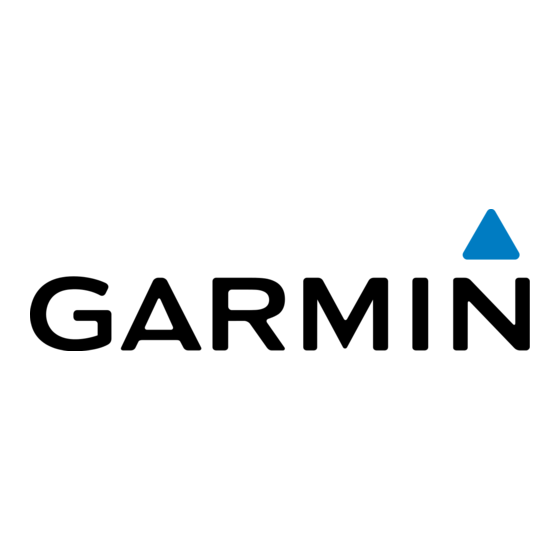Garmin EchoMap+ 42cv Handleiding voor installatie-instructies - Pagina 4
Blader online of download pdf Handleiding voor installatie-instructies voor {categorie_naam} Garmin EchoMap+ 42cv. Garmin EchoMap+ 42cv 6 pagina's.

NOTE: If the cables are not inserted far enough into the
cradle, the connectors may not connect securely to the ports,
and the device may appear to lose power or stop working.
4
Place the locking bracket
bracket down to lock the cables in place.
There is an audible click when the locking bracket is installed
correctly.
Installing the Device in the Cradle
After the cables are connected to the cradle, you can quickly
place the device in the cradle.
1
Place the base of the device in the bottom of the cradle.
2
Tilt the top of the device toward the cradle until it fastens in
place.
There is an audible click when the device is secured in the
cradle.
You should make sure the device is firmly secured in the cradle.
If the model uses a locking bracket, make sure the bracket is
firmly snapped shut. There is an audible click when the device
or locking bracket is installed correctly. If the device is not firmly
secured, it can lose power. The device can also fall out of the
cradle and become damaged if it is not firmly secured.
Removing the Device from the Cradle
1
Press the release lever
released.
2
Tilt the device forward, and lift it out of the cradle.
4
over the cables and slide the
NOTICE
on the cradle until the device is
Specifications
Specification
Dimensions on mount (W x H x
D)
Weight
Display size (W x H)
Display type
Display resolution
Material
1
Water rating
Temperature range
Fuse
Input voltage
2
Max. power draw
2
Typical current draw (RMS)
2
Max. current draw (RMS)
Compass-safe distance
3
Sonar frequencies
3
Transmit power (RMS)
4
Maximum depth
Memory card
Max. waypoints
Max. routes
Max. active track points
1
The device withstands incidental exposure to water of up to 1 m
for up to 30 min. For more information, go to
/waterrating.
2
Dependent upon transducer and chartplotter model.
3
Dependent upon transducer.
4
Maximum depth is dependent upon transducer, water salinity,
bottom type, and other water conditions.
NMEA 0183 Information
Transmit
Sentence Description
GPAPB
APB: Heading or track controller (autopilot) sentence "B"
GPBOD
BOD: Bearing (origin to destination)
GPBWC
BWC: Bearing and distance to waypoint
GPGGA
GGA: Global positioning system fix data
GPGLL
GLL: Geographic position (latitude and longitude)
GPGSA
GSA: GNSS DOP and active satellites
GPGSV
GSV: GNSS satellites in view
GPRMB
RMB: Recommended minimum navigation information
GPRMC
RMC: Recommended minimum specific GNSS data
GPRTE
RTE: Routes
GPVTG
VTG: Course over ground and ground speed
GPWPL
WPL: Waypoint location
GPXTE
XTE: Cross track error
PGRME
E: Estimated error
PGRMM
M: Map datum
PGRMZ
Z: Altitude
SDDBT
DBT: Depth below transducer
SDDPT
DPT: Depth
SDMTW
MTW: Water temperature
SDVHW
VHW: Water speed and heading
Measurement
102.3 x 203.9 x 4.6 mm (4 x 8 x
1
3
/
in.)
8
0.7 kg (1.6 lbs.)
1
3
53.9 x 95.0 mm (2
/
x 3
/
in.)
8
4
WQVGA
480 x 272 pixels
Polycarbonate plastic
IEC 60529 IPX7
From -15 to 55°C (from 5 to 131°F)
3 A, 125 V fast-acting
From 9 to 18 Vdc
5 W
0.5 A
2 A
25 cm (9.8 in.)
Traditional: 50, 77, 83, or 200 kHz
CHIRP Garmin ClearVü: 260, 455, or
800 kHz
500 W
701 m (2,300 ft) at 77 kHz
1 microSD
®
card slot; 32 GB max. card
size
5,000
100
50,000 points, 50 saved tracks
www.garmin.com
